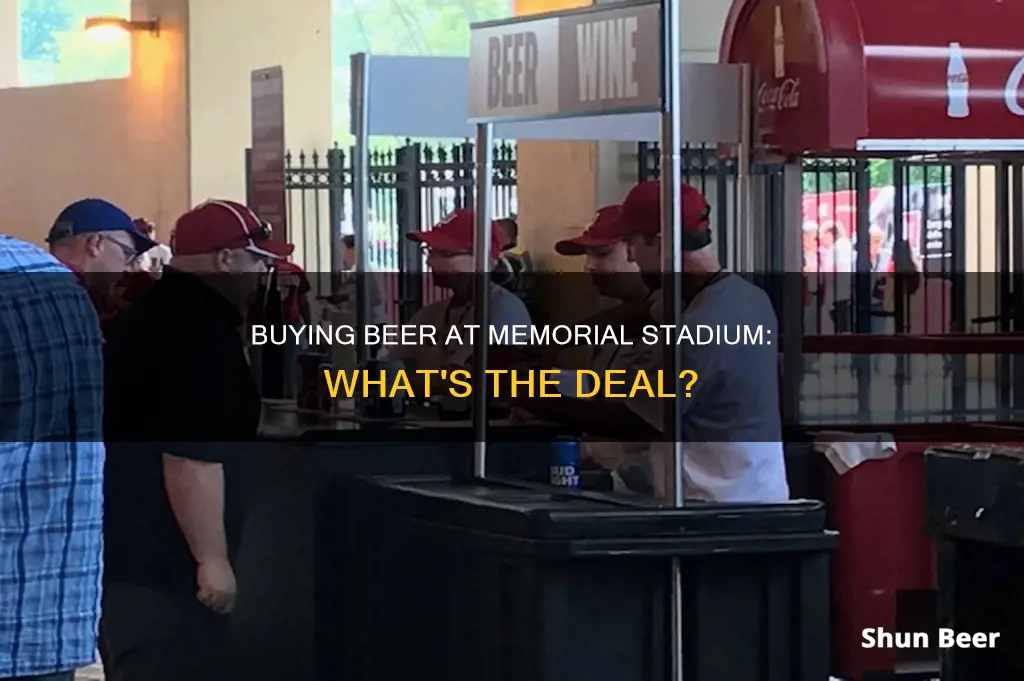
As of 2024, beer and other alcoholic drinks are not sold at Nebraska's Memorial Stadium for football games. However, the University of Nebraska Board of Regents has approved the sale of alcohol for special events, such as a Garth Brooks concert in 2021 and a volleyball doubleheader and country music concert in 2023. While there is no current plan to sell beer at football games, the Nebraska Athletic Department has conducted surveys gauging fan interest, with 72% of respondents expressing a positive or neutral attitude toward alcohol sales. The potential revenue from alcohol sales and the improved fan experience are factors that may influence future decisions regarding beer sales at Memorial Stadium.
What You'll Learn

Beer sales at Nebraska's Memorial Stadium
Nebraska's Memorial Stadium is one of the few remaining college football stadiums that don't serve alcohol on game days. However, there have been recent developments that indicate a potential shift towards beer sales at the stadium.
In 2022, the Nebraska Athletic Department conducted a survey to assess the overall experience of Memorial Stadium for fans. Almost 22,000 people responded, and 72% showed a positive or neutral attitude toward alcohol sales. While Nebraska has historically prohibited alcohol sales at its home football stadium, other Big Ten schools have started to relax their policies. Iowa, Illinois, Indiana, Minnesota, Ohio State, Purdue, Rutgers, and Maryland all sell alcohol at football games, either stadium-wide or in premium seating areas.
In June 2023, the University of Nebraska Board of Regents approved alcohol sales, specifically beer sales, in Memorial Stadium for a special event. This event, taking place in August 2023, includes a doubleheader volleyball match featuring four Nebraska schools and a country music concert by Scotty McCreery. This marks the second time that alcohol has been approved for a special event at Memorial Stadium, the first being a Garth Brooks concert in 2021.
While there are no current plans to introduce beer sales at football games, the topic has been under discussion. Athletic Director Trev Alberts has stated that any consideration of alcohol sales would need to be part of a broader conversation about improving the fan experience at Memorial Stadium. The stadium is almost 100 years old and is expected to undergo renovations to enhance the fan experience, with alcohol sales potentially being a part of that discussion.
The University of Nebraska-Lincoln has also proposed a pilot program to sell alcohol at men's and women's basketball games, which would be a step towards introducing alcohol sales at athletic events. However, as of September 2024, Nebraska athletics officials have stated that they are not yet ready to introduce beer sales at Memorial Stadium for football games.
Buying Beer on Craigslist: Legal or Not?
You may want to see also

Alcohol sales at college football games
A survey by The Associated Press found that, as of November 2023, 80% of major college football schools sell alcohol inside their stadiums on game days. This includes 55 of the 69 Power Five conference schools and Notre Dame. The remaining schools either sell alcohol in non-public areas, such as private suites, or do not sell alcohol at all.
Nebraska's Memorial Stadium, the home of the Cornhuskers, is one venue where alcohol sales have been a topic of discussion. In March 2022, a survey conducted by the Nebraska Athletic Department found that 72% of the nearly 22,000 respondents showed a positive or neutral attitude toward alcohol sales. While Nebraska has not yet allowed alcohol sales during football games, they have approved it for special events, such as a Garth Brooks concert in 2021 and a volleyball doubleheader and country music concert in 2023.
The University of Nebraska Board of Regents' decision to approve alcohol sales for these events was influenced by the potential for increased revenue and the desire to enhance the fan experience. However, some regents expressed concern about maintaining a family-friendly atmosphere and ensuring adequate food and beverage options for longer events.
Other Big Ten schools that do not sell alcohol during football games include Michigan, Michigan State, Northwestern, Penn State, and Wisconsin. However, some of these schools offer alcohol in premium seating areas or as part of seat donations.
The sale of alcohol at college football games has sparked a debate between those who view it as a way to enhance revenue and the game-day experience and those who have apprehensions about the potential impact on the family-friendly atmosphere and fan behaviour. While some schools have taken a cautious approach, gradually introducing alcohol sales and monitoring the data, others have embraced it as a way to align with the practices of professional sports and the preferences of adult fans.
Buying Beer on Easter: Forsyth County, Georgia Laws Explained
You may want to see also

Alcohol sales at other sports games
Alcohol sales at sports games have become an increasingly common occurrence, with 80% of Power Five schools now selling alcohol at college football games. This shift has been driven by universities' desires to "bring in more revenue and attract fans into the venues".
The University of Nebraska's Memorial Stadium is one such example of this change. In 2022, the Nebraska Athletic Department conducted a survey of donors, season ticket holders, and single-game buyers to gauge their overall experience and satisfaction with Memorial Stadium. The survey results revealed that while fans were generally satisfied with the event staff and game-day atmosphere, they ranked the seats at the stadium below average.
One of the most notable findings from the survey was that 72% of the nearly 22,000 respondents expressed a positive or neutral attitude toward alcohol sales. Nebraska, along with Michigan, Michigan State, Northwestern, Penn State, and Wisconsin, were the only remaining Big Ten schools that did not allow alcohol sales at their home football stadiums at the time.
Following the survey, the University of Nebraska Board of Regents approved alcohol sales for a special event in Memorial Stadium in 2023. This event marked the second time that regents had approved alcohol sales at the stadium, the first being for a Garth Brooks concert in 2021. The 2023 event was a combination of a volleyball doubleheader and a country music concert, with beer sales limited to 16-ounce cans.
Other universities have also begun to relax their restrictions on alcohol sales. For example, the University of Iowa announced a test program in 2021 to sell alcohol and wine at football games to the general public, becoming the eighth Big Ten school to do so. This shift has sparked discussions among Nebraska fans about the possibility of alcohol sales at Memorial Stadium for football games, which have not been planned as of 2024.
The impact of alcohol sales at sports games has been a topic of research interest. A study at a large Midwestern university examined the impact of alcohol sales in a college football stadium on healthcare utilization. The study found no significant increase in alcohol-related emergencies or emergency department visits, suggesting that in-stadium alcohol sales can be introduced without adversely affecting public health.
In summary, alcohol sales at sports games have become a growing trend, with universities seeking additional revenue streams and ways to enhance the fan experience. While there are varying opinions on this topic, with some expressing concerns about potential alcohol-related problems, the shift toward alcohol sales at sports venues continues.
Where to Buy Beer on Labor Day
You may want to see also

The impact of alcohol sales on fan experience
Alcohol sales at sports stadiums have been a topic of debate for many years. While some people argue that it enhances the fan experience and can boost revenue for the team, others express concerns about potential negative impacts on the game-day atmosphere and safety. The impact of alcohol sales on fan experience is a complex issue that needs to be carefully considered by stadium management and team officials.
On one hand, allowing alcohol sales at Memorial Stadium can lead to a more vibrant and exciting atmosphere for fans. Adults who enjoy drinking can enhance their game-day experience by having a beer in hand while cheering on their favourite team. Alcohol sales can also be a significant revenue stream for the stadium and the team, providing additional financial resources that can be reinvested into improving facilities, signing better players, or reducing ticket prices for fans. In the case of Memorial Stadium, a survey found that 72% of respondents showed a positive or neutral attitude toward alcohol sales, with some believing it would enhance the overall experience of game day.
On the other hand, there are valid concerns about the potential negative impacts of alcohol sales on fan experience. One of the main concerns is related to fan behaviour and safety. Alcohol consumption can lead to drunk and disorderly conduct, which could detract from the experience of families and younger fans in attendance. Additionally, stadium management and security personnel would need to deal with potentially intoxicated individuals, ensuring the safety and comfort of all fans. This could include implementing additional security measures, which may be costly and impact the overall fan experience.
Another consideration is the infrastructure required to support alcohol sales. Memorial Stadium would need to ensure that they have the necessary concessions and facilities to handle alcohol sales, which could involve significant renovations and expenses. Furthermore, the sale of alcohol at sports events has been associated with binge drinking and excessive consumption, particularly in the early days of alcohol sales at stadiums. This can lead to negative health consequences and impact the overall fan experience if not properly managed.
Lastly, the impact of alcohol sales on fan experience may depend on the specific context and culture of the stadium and its fans. For example, some fans may prefer a more family-friendly environment, while others may appreciate the option to purchase alcohol. The impact of alcohol sales on fan experience is likely to vary based on factors such as the average age of attendees, the team's performance, and the existing fan culture.
In conclusion, the impact of alcohol sales on fan experience is multifaceted and depends on various factors. While it can enhance the experience for some fans and boost revenue for the team, it also presents challenges related to fan behaviour, safety, infrastructure, and public health. Stadium management and team officials need to carefully weigh these factors and make decisions that prioritize the overall fan experience, safety, and well-being.
Texas Law: Buying Beer for Your Son
You may want to see also

The financial impact of alcohol sales at sports games
Alcohol sales at sports games have been a topic of debate for many years. While some see it as an opportunity to generate additional revenue and enhance the fan experience, others express concerns about potential negative impacts on public health and safety. In recent years, more colleges and universities have started allowing alcohol sales at their sports stadiums, joining the long-held tradition of alcohol availability at professional sporting events. This shift has led to discussions about the financial impact of alcohol sales at sports games, especially in college athletics, where budgets are tighter.
Increased Revenue
One of the primary motivations for colleges to consider alcohol sales at sports games is the potential for increased revenue. With rising athletics expenses and stagnant or slowly growing revenues, athletic departments are exploring new ways to fund their operations. Alcohol sales can generate revenue through two main channels: increased attendance and higher concession sales.
For example, consider a scenario where 30,000 fans at a college football stadium, which is about one-third of the capacity, each purchase two beers at $8 per beer, for one home game. This would result in gross revenue of $480,000. Over seven home games, the gross total amounts to $3.36 million. However, it's important to note that the vendor typically takes a significant cut of the revenue, and there are additional expenses to consider. After these deductions, the final net revenue may be lower than expected.
Enhancing Fan Experience
Alcohol sales are also seen as a way to enhance the fan experience and attract new market segments. By offering alcohol, particularly in premium seats or suites, institutions can provide an added amenity that some fans are willing to pay a premium for. This strategy can be especially effective for casual sports fans who are seeking new entertainment experiences and may be drawn to the availability of alcohol. Additionally, alcohol sales can help address declining student attendance at college sports games by providing a legal product to of-age students, although the causal relationship between alcohol sales and increased student attendance is not yet clear.
Public Health and Safety Concerns
While the financial benefits of alcohol sales are appealing, there are also concerns about the potential impact on public health and safety. Some argue that mixing alcohol and family-oriented events may not be appropriate, especially with the presence of children. There are worries that alcohol sales may promote alcohol consumption among young people, and organizations like Mothers Against Drunk Driving (MADD) have consistently opposed in-stadium alcohol sales.
Furthermore, institutions need to consider the additional safety and legal concerns that come with alcohol sales. They must navigate local, state, and athletic conference regulations, and they may face increased liability if incidents occur due to fan intoxication. To mitigate these risks, many schools implement "best practices" for in-stadium alcohol sales, including limiting the number of drinks sold per transaction, terminating sales at predetermined times, using higher price points, and establishing designated driver programs.
In conclusion, the financial impact of alcohol sales at sports games, particularly in college athletics, is a complex issue. While alcohol sales can generate additional revenue and enhance the fan experience, institutions must carefully weigh these benefits against potential public health and safety concerns. The decision to allow alcohol sales requires a thorough examination of the institution's unique situation, including its fan base, local culture, legal restrictions, and other factors.
Kwik Trip Neenah: Beer Buying Experience
You may want to see also
Frequently asked questions
No, beer and alcohol sales are not permitted at Memorial Stadium.
Nebraska is one of the few Big Ten schools that do not allow alcohol sales at their home football stadiums.
The University of Nebraska is considering it, but there are currently no plans to sell alcohol at Memorial Stadium for football games.
There are bars located near Memorial Stadium that sell alcohol.
Yes, alcohol sales are permitted at the University of Nebraska-Lincoln's men's and women's basketball games and other sporting events.







